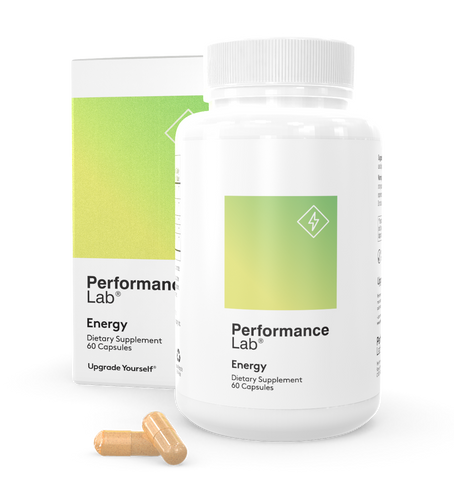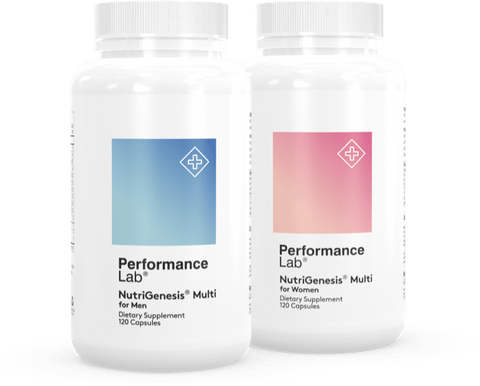Bedtime struggles are real for many people. More than a third of Americans fail to get enough sleep, says the CDC. (1)
And experts reckon that between 50-70 MILLION adults in the U.S. may be officially sleep deprived. (2) It's a national health epidemic.
While many people aren’t diagnosed with insomnia, they still struggle nightly with sleep disruptions and sleep disorders that prevent them from getting the rest they need.
Whether it be difficulty falling asleep or staying asleep, it’s not fun to deal with - and poor sleep quality can lead to various health issues down the line.
To curb sleep problems, many people turn to natural supplements like magnesium, melatonin, and herbs to help them fall asleep - but what about vitamin A? Could it help with restful sleep, and cure any sleep problems?
While it may be more well-known for its role in vision, vitamin A does appear to have a connection to sleep.
In this article, we dig into the details of vitamin A and sleep and give you some of our best remedies to improve sleep quality, get a peaceful night’s rest and have boundless next-day energy with no daytime sleepiness.
Key Takeaways
- Vitamin A is best known for its role in vision and immunity, but it also influences brain function and sleep regulation.
- Research suggests that vitamin A helps support the brain regions and signaling pathways involved in maintaining healthy sleep patterns.
- A deficiency may contribute to sleep problems, while adequate intake is one part of a broader strategy for better rest.
- For most people, focusing on balanced nutrition, a quality multivitamin, and good sleep hygiene is more effective than chasing one single vitamin for sleep.

What Is Vitamin A?

Have you heard about vitamin A before? If you’re like most people, you’re familiar with it thanks to its role in eye health and vision, but vitamin A has a bigger job than just protecting the eyes.
Contrary to what most people think, vitamin A isn’t a single vitamin—it’s a group of fat-soluble compounds that include retinol, retinal, and retinyl esters.
In nature, you’ll find vitamin A in two forms:
-
Preformed vitamin A, also known as retinol. Found in animal foods. Food rich in this 'active form' of vitamin A includes liver, eggs and milk.
-
Provitamin A, also known as the carotenoids. Found in plant foods such as mangos, squashes, sweet potatoes and carrots.
When consumed through food or supplementation, retinol is converted to retinoic acid, retinal, and retinyl esters, the only three forms of vitamin A the body can use immediately.
Any other form must undergo conversion before use. Carotenoids are an example of that. They are a group of more than 750 naturally occurring plant pigments that give fruits and vegetables their vibrant red, orange, and yellow hues.
But unlike the active form of vitamin A, carotenoids must convert into retinol and further into retinal before they can be used. (3, 4)
Roles of Vitamin A
While we may only know vitamin A for one function, it serves plenty of roles in the body, including:
-
Eye health and vision
-
Immunity
-
Reproduction
-
Skin health
-
Bone health
-
Growth and development
Like most nutrients, it has widespread roles throughout the body, making it an essential part of the diet. (5)
But what about sleep? Does vitamin A have a role to play in our sleep patterns, can it improve sleep quality?
Vitamin A and Sleep Quality: Is There A Link?

We already know that vitamin A plays a vital role in maintaining healthy eyes and vision. In order to see the full spectrum of light, the eye needs certain pigments that allow the retina to work properly.
Vitamin A aids the production of these pigments and encourages good eyesight, especially in low light.
A vitamin A deficiency, in contrast, interrupts the creation of the pigments needed, potentially leading to night blindness or impaired night vision.
Vitamin A also helps to nourish the cornea and other parts of the eye, helping to keep them properly lubricated. (6)
Vitamin A and our Circadian Rhythms
But here's where it gets interesting. The retina and vitamin A is also responsible for light detection in the eye, which is a key component of the sleep-wake cycle.
Indeed, vitamin A has been shown to influence biological rhythms in birds, insects and mammals, particularly the Circadian Rhythm (sleep-wake cycle).
The retina has its own circadian clock that detects changes in light throughout the day, evening and night.
This clock stimulates the production of melatonin, the 'sleep hormone' - letting your body know when and how to get ready for sleep. Essentially keeping track of time for you and making it easier for you to fall asleep.
As such, without sufficient vitamin A, the brain can’t differentiate between daylight and nighttime, and our circadian rhythms will be wonky. (7, 8)
Anything that disrupts this clock may interfere with healthy sleep patterns, potentially causing sleep disorders and insomnia symptoms. Playing havoc with sleep onset, sleep duration, sleep quantity, causing daytime sleepiness, and more. And trouble sleeping is no fun.
According to the Sleep Foundation, people who consume little vitamin A 'tend to go short on sleep.' (9)
Of course, losing sleep can have a knock-on effect on mood, depressive symptoms, cognitive performance and more. So it's in our interests to gain enough vitamin A to enjoy better sleep.
Scientific Evidence For Vitamin A and Sleep

Although you’ll find little information in the way of vitamin A directly supporting sleep health -- most of that’s reserved for more common sleep supplements -- there is some evidence supporting the role of vitamin A in the circadian rhythm, especially in relation to vitamin deficiencies .
One recent study (2022) examining Vitamin A Deficiency (VAD) discovered that it may affect both photo-response (biological response to light) and the sleep cycle, as well as learning, memory, cell metabolism, and more. (10)
Another study examining the relationship between micronutrient intake and sleep status concluded that vitamin A helps to modulate the circadian-sleep process, with low dietary vitamin levels affecting sleep duration, sleep phase and sleep stages. (11)
Other Vitamins That May Boost your Sleep Quality
While we're talking about micronutrient and vitamin intake, let me deviate for a second here to let you know about some other vitamins that may influence your sleep. As well as vitamin A, studies have also discovered that:
-
Vitamin B6 can help to ease symptoms of restless legs syndrome, encouraging restful sleep.
-
There is some evidence to suggest that low vitamin B12 levels may increase the risk of insomnia or sleep loss for certain groups of people. (12)
-
Vitamin D also influences the sleep-wake cycle or circadian system, with a vitamin D deficiency shown to interrupt sleep timing.
-
Vitamins C and E may help to reduce symptoms of restless legs syndrome and obstructive sleep apnea. Vitamin E may also reduce night sweats for menopausal or postmenopausal women.
-
Vitamin C's antioxidant properties may help to tackle oxidative stress, which influences sleep. (13)
See our article on the Best Vitamins for Insomnia symptoms and Sleep Deprivation
A healthy diet is the best way to make sure you're achieving all of the nutrients your body needs to prevent sleep troubles, but you could also choose to top up with vitamin supplements.
Back to vitamin A...
Other Health Benefits Of Vitamin A
Although the relationship between vitamin A and sleep is complex and still being explored, there are many other benefits to getting enough vitamin A, which can also influence various health outcomes.
1. Protects against night blindness and age-related vision decline

Vitamin A is essential for converting light into an electrical signal transmitted to the brain. One of the first signs of low vitamin A is night blindness, also known as nyctalopia. (14)
Because vitamin A is a major component of the pigment rhodopsin, which is highly sensitive to light, a lack of vitamin A can impair vision in low-light conditions.
Beta-carotene (which can be converted into vitamin A) also helps preserve vision and slow age-related decline in eyesight. (15)
Although the exact cause isn’t clear, it’s thought that age-related macular degeneration (AMD) may be partially due to cellular damage to the retina.
2. Boosts immune function
Vitamin D, zinc, and vitamin C are the classic immune trio, but don’t forget about vitamin A. Studies have shown that vitamin A helps to support and regulate the innate immune system, helping to boost our immune health and defend against multiple infectious diseases. (16)
3. Promotes better skin
Topical vitamin A is a big thing in the skincare world, and studies show that vitamin A can have profound effects on improving the appearance of skin and minimizing the signs of aging. It’s been shown to:
-
Increase skin cell turnover
-
Improves skin texture and tone
-
Boosts collagen production
-
Reduces the appearance of fine lines and wrinkles
-
Treats acne
-
Reduces post-inflammatory hyperpigmentation
For more details on vitamin A and skin health, check out this article.
4. Supports Bone Health

Although most people aren’t aware of the links between vitamin A and bone health, it’s just as important as calcium and vitamin D.
Both osteoblasts (bone-building cells) and osteoclasts (bone-breaking down cells) are influenced by levels of vitamin A, and studies show that people with lower blood levels of vitamin A are at an increased risk of bone fractures. (17)
But it’s not just low vitamin A - high intakes of vitamin A are also linked to an increased risk of fractures. Some scientists also suggest the source of vitamin A - from animal foods or from plant foods - may also make a difference, but more research is needed. (18)
Either way, while the link between the two isn’t clear, it is evident that vitamin A is crucial for healthy bones.
Recommended Dosage of Vitamin A
It's important to talk about dosage with vitamin A because this is one vitamin that can be harmful if taken in too high doses. The recommended daily amount is:
-
900 mcg (micrograms) for men
-
700 mcg for women.
Taking super high doses, such as more than 10,000mcg a day in supplements, can cause headache, nausea, joint pain, balance issues, and liver damage. Taking double that in a single dose can cause nausea, fatigue, vomiting, blurred vision, and dizziness.
Pregnant women should first speak to their doctor before taking any cream or supplements containing vitamin A as high doses have been linked to birth defects. (19)
The Solutions You Need
If your intake of vitamin A is sufficient and you’re still feeling sleepy, we have a few solutions for you!
If you need more sleep…
We all struggle with sleep now and again, but for anyone who finds themselves tossing and turning more than they are sleeping, Performance Lab Sleep is an option.
While it doesn't include any vitamin A, it does include tried-and-tested ingredients designed to help you get better sleep.
Featuring a low-dose of natural melatonin derived from Montmorency tart cherry paired with tryptophan (the precursor to melatonin) and three types of magnesium, Sleep aims to promote a deeper sleep with no next-day drowsiness.

If you need an energy boost…
Missed out on sleep and desperate for a surge of energy without hitting heavy caffeine? We have two solutions for you.
First, try Performance Lab Energy, designed to supercharge your mitochondria, your body's natural energy source. Energy is stimulant-free.
Alternatively, if you’re in the mood for a light caffeine hit, Performance Lab Caffeine 2 offers a moderate, controlled dose of caffeine stacked with boosters and balancers for more natural, stable energy throughout the day.
No crashes, no burnout, and no nasty side effects - just clean, healthy, more relaxed energy.

If you want nutritional maintenance…
And for anyone looking for general maintenance to avoid the pitfalls of nutrient deficiencies and excesses, Performance Lab NutriGenesis Multi is your gem.
Explicitly designed with male and female needs in mind, Multi supplies 100% Daily Value of at least 14 vitamins and minerals in a bioavailable and bioidentical form, thanks to NutriGenesis technology.
NutriGenesis Multi also provides 55% (women) or 66% (men) of your Daily Value of Vitamin A.

Shop Performance Lab® NutriGenesis®
References
- 1 in 3 adults don’t get enough sleep, CDC, https://archive.cdc.gov/www_cdc_gov/media/releases/2016/p0215-enough-sleep.html
- Sleep deprivation, Cleveland Clinic, https://my.clevelandclinic.org/health/diseases/23970-sleep-deprivation
- Gilbert C. What is vitamin A and why do we need it?Community Eye Health. 2013;26(84):65.
- O’Byrne SM, Blaner WS. Retinol and retinyl esters: biochemistry and physiology. J Lipid Res. 2013;54(7):1731-1743.
- Vitamin A, MedlinePlus, https://medlineplus.gov/ency/article/002400.htm
- What Is Vitamin A Deficiency? American Academy of Opthalmology, https://www.aao.org/eye-health/diseases/vitamin-deficiency
- A Circadian Clock in the Retina Regulates Rod-Cone Gap Junction Coupling and Neuronal Light Responses via Activation of Adenosine A2A Receptors,Frontiers in Cellular Neuroscience, 2021, https://www.frontiersin.org/journals/cellular-neuroscience/articles/10.3389/fncel.2020.605067/full
- Impacts of vitamin A deficiency on biological rhythms: Insights from the literature, Frontiers in Nutrition, 2022, https://www.frontiersin.org/journals/nutrition/articles/10.3389/fnut.2022.886244/full
- What are Sleep Vitamins, Sleep Foundation, https://www.sleepfoundation.org/sleep-aids/vitamins-for-sleep
- Impacts of vitamin A deficiency on biological rhythms: Insights from the literature, Frontiers in Nutrition, 2022, https://www.frontiersin.org/journals/nutrition/articles/10.3389/fnut.2022.886244/full
- Ji X, Grandner MA, Liu J. The relationship between micronutrient status and sleep patterns: a systematic review. Public Health Nutr. 2017 Mar;20(4):687-701. doi: 10.1017/S1368980016002603. Epub 2016 Oct 5. PMID: 27702409; PMCID: PMC5675071.
- Bouloukaki I, Lampou M, Raouzaiou KM, Lambraki E, Schiza S, Tsiligianni I. Association of Vitamin B12 Levels with Sleep Quality, Insomnia, and Sleepiness in Adult Primary Healthcare Users in Greece. Healthcare (Basel). 2023 Nov 23;11(23):3026. doi: 10.3390/healthcare11233026. PMID: 38063594; PMCID: PMC10706823.
- Vitamins for Sleep, Sleep Foundation, https://www.sleepfoundation.org/sleep-aids/vitamins-for-sleep
- Night Blindness (Nyctalopia), Cleveland Clinic, https://my.clevelandclinic.org/health/symptoms/10118-night-blindness-nyctalopia
- Wu J, Cho E, Willett WC, Sastry SM, Schaumberg DA. Intakes of Lutein, Zeaxanthin, and Other Carotenoids and Age-Related Macular Degeneration During 2 Decades of Prospective Follow-up. JAMA Ophthalmol. 2015 Dec;133(12):1415-24. doi: 10.1001/jamaophthalmol.2015.3590. PMID: 26447482; PMCID: PMC5119484.
- Huang Z, Liu Y, Qi G, Brand D, Zheng SG. Role of Vitamin A in the Immune System. J Clin Med. 2018 Sep 6;7(9):258. doi: 10.3390/jcm7090258. PMID: 30200565; PMCID: PMC6162863. https://pmc.ncbi.nlm.nih.gov/articles/PMC6162863/#sec9-jcm-07-00258
- Zhang X, Zhang R, Moore JB, et al. The Effect of Vitamin A on Fracture Risk: A Meta-Analysis of Cohort Studies. Int J Environ Res Public Health. 2017;14(9):1043.
- Tanumihardjo SA. Vitamin A and bone health: the balancing act. J Clin Densitom. 2013;16(4):414-419.
- Vitamin A, Mayo Clinic, https://www.mayoclinic.org/drugs-supplements-vitamin-a/art-20365945















